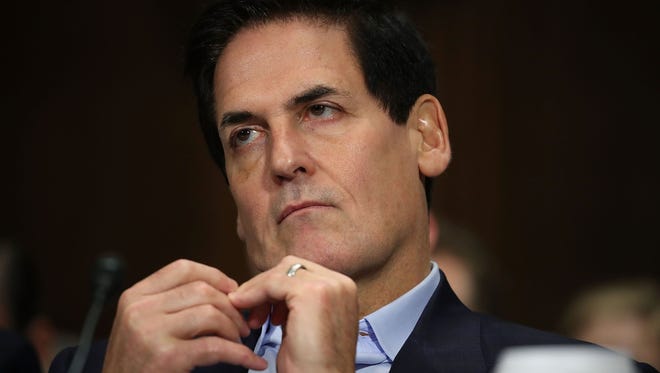Cuban: Trump can't stop rise of the robots and their effect on U.S. jobs

Add Mark Cuban to the list of tech visionaries exhorting the need to address the advance of robotics and artificial intelligence.
"Automation is going to cause unemployment and we need to prepare for it," Cuban posted on Twitter with a link to an essay about the rise of robots in the workplace.
Employment and jobs have been a hot topic recently with President Trump's emphasis on getting U.S. corporations to focus on jobs at home and his plans of tightening of trade and immigration policies to foster job growth. Automakers including Fiat Chrysler, GM and Ford, as well as Intel and Walmart have recently announced plans that the companies say will create new jobs.
But the Dallas Mavericks owner and Shark Tank judge has been critical of President Trump — during the NBA All-Star Celebrity Game on Friday in New Orleans, Cuban wore a jersey with the number 46, a nod to Trump's successor in the White House (Trump is the 45th U.S. president).
However, "this has nothing to do with who voted for who," Cuban said in an email exchange with USA TODAY. "It's the path technology is taking. The biggest difference between now and the past is the speed of change. I don't think people realize just how quickly this is happening."
The president is missing a key factor when it comes to job creation, Cuban last week told CNBC. "I'm willing to bet these companies building new manufacturing plants when it is all said and done these are going to end up leading to fewer people being employed," Cuban said. "... and there is nothing President Trump can do to stop that because of the trends in technology — machine learning, neural networks, deep learning, etc. — changing the nature of work."
Trump's intentions "may be good," he said. However, the reality is that major companies — those in the Fortune 500, S&P 500 and Dow 30 — are going to employ fewer people "to get a lot more done," Cuban said. "And we are going to have to deal with 'How do we address the disruption that is going to happen in employment for these big companies?'"
Cuban's tweet on Sunday referenced a Medium.com essay, penned by Quincy Larson, a teacher at Free Code Camp, that summed up recent statements by Stephen Hawking, Bill Gates and Elon Musk on the growing concern "about how quickly robots are taking away human jobs."
Among the job categories threatened in the short term: drivers and delivery people, warehouse workers, retail salespeople and cashiers, and restaurant workers.
Mass unemployment "is going to be a massive social challenge," the essay quoted Tesla co-founder and SpaceX founder Musk saying last week at the World Government Summit in Dubai. "There will be fewer and fewer jobs that a robot cannot do better (than a human).. These are not things that I wish will happen. These are simply things that I think probably will happen.”
Also noted in the essay, Microsoft co-founder Gates' comments last week to online publication Quartz that robots that replace human workers should be taxed just as the human worker had been — as a way to offset automation's societal effect. “Right now if a human worker does you know, $50,000 worth of work in a factory, that income is taxed if a robot comes in to do the same thing," he said, "you’d think we’d tax the robot at a similar level."
Cuban is on top of the subject. He tweeted this response last week to Riot Games' co-founder Marc Merrill's post about Gates' robot tax suggestion. "There should be a tax and some should be paid in stock of the company," he tweeted in response.

More:
Special report: Automation puts jobs in peril
Bill Gates: If a robot takes a human job, it should be taxed
What Elon Musk stands to gain and lose with Trump
Stephen Hawking: We might have 1,000 years left on Earth
Follow USA TODAY reporter Mike Snider on Twitter: @MikeSnider.